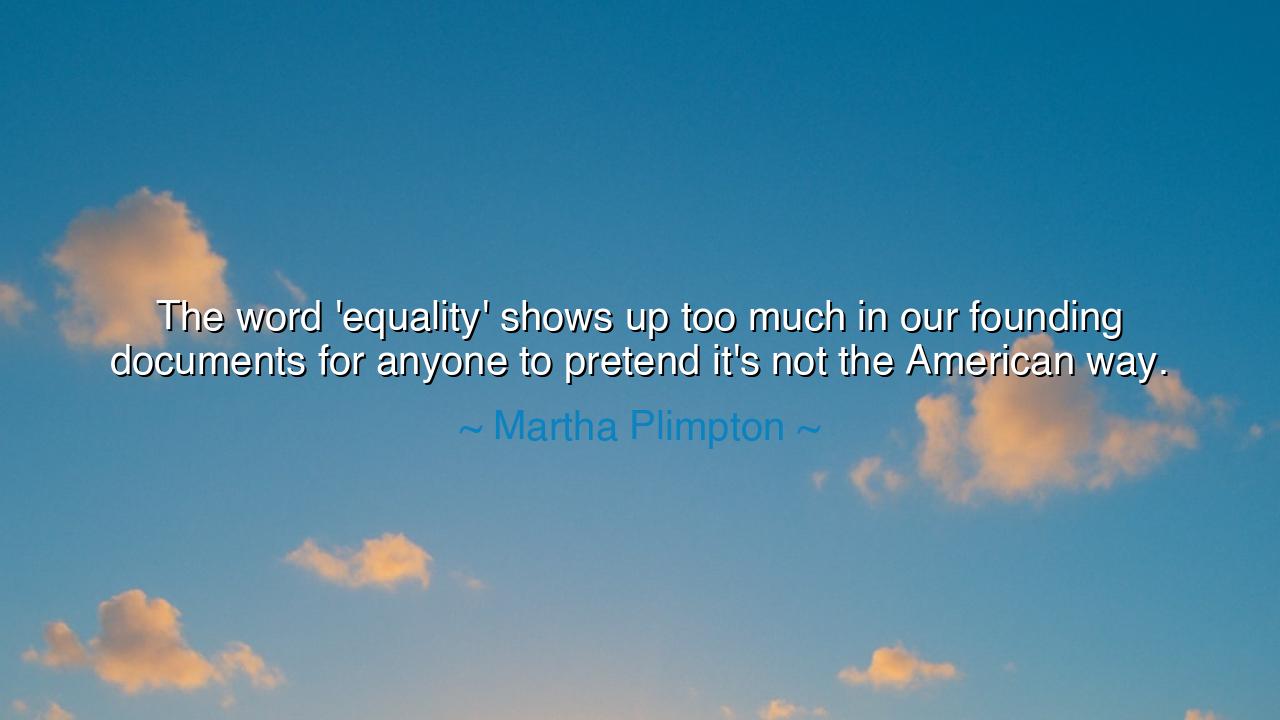
The word 'equality' shows up too much in our founding documents
The word 'equality' shows up too much in our founding documents for anyone to pretend it's not the American way.






“The word ‘equality’ shows up too much in our founding documents for anyone to pretend it’s not the American way.” In these words, Martha Plimpton, an actress and activist of our age, speaks with the fire of conviction and the clarity of truth. Her statement is not a mere observation about language; it is a call to remembrance — a reminder to a nation that its sacred texts were written not for the convenience of the powerful, but for the dignity of all. The ancients said that a people forgets its soul not through conquest, but through amnesia. So too does Plimpton warn that America, in forgetting the meaning of equality, risks betraying the very essence of its creation.
When she points to the founding documents, she invokes the moral architecture of a nation: the Declaration of Independence, which proclaims that “all men are created equal”; the Constitution, which begins with “We the People”; and the Bill of Rights, which guards liberty and justice for all. These words, written in the ink of idealism, were not perfect when they were born — for even as they were written, not all were free, not all were seen. Yet the power of these documents lies in their promise — that equality, though delayed, is destiny. Plimpton’s words remind us that equality is not an addition to the American way; it is its very foundation.
The origin of this truth stretches back to the fires of revolution. When the colonies cast off the chains of empire, they did so not for wealth or vengeance, but for an idea — that men and women could govern themselves, and that every human being, by virtue of birth, possessed inherent worth. This idea was radical, even blasphemous to the crowned heads of Europe. But it was written into the marrow of the American experiment. To deny equality, then, is not merely to turn one’s back on progress — it is to deny the nation’s own soul.
Yet history has shown that ideals are easier to write than to live. The very founders who penned the words of equality also lived within a system of inequality — slavery, disenfranchisement, and hierarchy. But this contradiction does not nullify the principle; it magnifies its necessity. It shows that equality was not a finished work, but a sacred pursuit, a light toward which generations would have to walk. Every movement for justice in American history — from abolition to suffrage, from civil rights to marriage equality — has been a step toward fulfilling the promise that was written long ago. Plimpton’s statement, then, is not only about the past, but about the unfinished labor of the present.
Consider the story of Frederick Douglass, born into slavery yet destined to become one of the most powerful voices for human freedom. When he read the founding documents, he did not reject them; he demanded that the nation live up to them. “What, to the American slave, is your Fourth of July?” he asked. His words were both accusation and hope — a call for America to become what it claimed to be. Douglass, like Plimpton centuries later, understood that the strength of a nation lies not in its perfection, but in its capacity for self-correction. Equality, in his view, was not a gift to be granted, but a truth to be remembered.
Plimpton’s declaration carries that same spirit into the modern world, where inequality still lingers — in wages, in justice, in opportunity. She speaks against the temptation to rewrite history, to pretend that equality was never the heartbeat of the republic. Her words are a defense of memory — a refusal to allow cynicism to erase the moral vision that gave birth to democracy. For to forget the word equality is to forget the people; to forget the people is to lose the nation.
And so, let this truth be carried forward as a teaching for future generations: the measure of a nation’s greatness is not in its wealth or power, but in its fidelity to its promises. Equality is not a word to be spoken once and set aside; it is a law of the spirit that must be lived, defended, and renewed in every age. Each citizen must be both guardian and student of that ideal. Teach your children that equality is not charity, but justice; not weakness, but strength; not a political slogan, but the essence of humanity itself. For if America ever forgets this truth, it will lose not only its way, but its very reason for being.
Thus, Martha Plimpton’s words echo like a bell through time: equality is not a new invention, nor a modern demand — it is the promise inscribed at the nation’s birth. To live by it is not a burden, but an inheritance. And to defend it, even in dark times, is the highest form of patriotism — the fulfillment of the American way.






AAdministratorAdministrator
Welcome, honored guests. Please leave a comment, we will respond soon